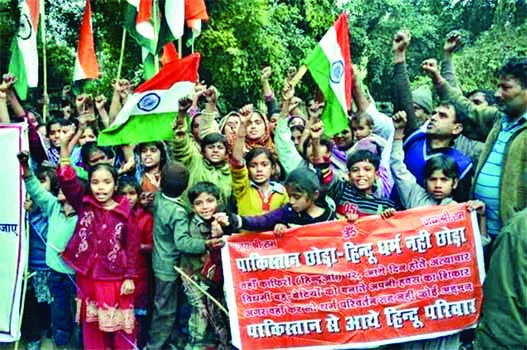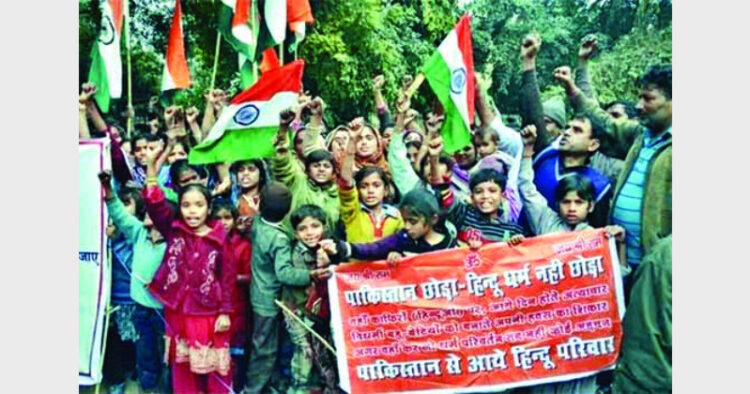
The reason for my resignation, as I have communicated to you, arises out of the policy pursued regarding Indo-Pakistan relationship, especially relating to Bengal. The Agreement which, I suppose, will be finalised today does not touch the basic problem and is not likely to offer any solution. I can under no circumstances be a party to it. Apart from the fact that it will bring little solace to the sufferers, it has certain features which are bound to give rise to fresh communal and political problems in Bharat, the consequences of which we cannot foresee today. In my humble opinion, the policy you are following will fail. Time alone can prove this”
– Dr Syama Prasad Mookerjee in his resignation letter to Pt Nehru on April 6, 1950
“Our quarrel with Pakistan is a part of our foreign policy about which I feel deeply dissatisfied…..I felt that we should be more deeply concerned with East Bengal where the condition of our people seems from all the newspapers intolerable than with Kashmir.” These were the words of Dr Babasaheb Ambedkar while tendering his resignation from Pt Nehru’s cabinet on September 27, 1951. Dr Mookerjee had resigned on the same ground in 1950 itself. Stalwarts like Hiren Mukherjee of CPI and Ram Manohar Lohiya of Socialist Party also raised the same concerns in the 1960s.
The nationalist organisations like the Rashtriya Swayamsevak Sangh (RSS) not just passed the resolutions on numerous occasions but also worked on ground to provide relief and rehabilitation to the persecuted communities. Most of the people did not stay there in Islamic States as choice but under compulsion. They even did not demand Partition. The exploitation, persecution, conversion, abduction, land grabbing, death or forced migration have been the sequence of fate for these victims of Partition. Civilisationally, we have been giving shelter to such persecuted communities; the people who have come to Bharat due to religious persecution not just to take refuge but to return to the land of ancestors. The passing of the Citizenship Amendment Bill-2019 has finally addressed these concerns. The deliberation on this Bill has opened up discussion on many historical wrongs and simultaneously exposed the forces who want to communalise everything for their petty political ends.
The Partition was the darkest chapter of our recent history. Though in the idea of Bharat, people were never divided on religious lines since time immemorial, the people negotiating independence accepted the separate State for Muslims. The persecution of minorities was a natural outcome of formation of the Islamic States around us. The first person to see the disastrous effects of such theocratic State was Dr Ambedkar who was unapologetic about complete exchange of population as he could foresee the future of minorities in Pakistan. As the records show, inhuman treatment has been a reality for the minorities first in Pakistan, then in Bangladesh and Afghanistan, from the day of Partition. Besides initial rehabilitation camps, there was no official policy to accommodate these people. The enabling amendment to expedite the citizenship has allowed to look back at this wrong and provided with the opportunity to correct them.
The ostrich approach of the Congress Governments did not take any step to address these concerns of persecution in the neighbourhood. The pseudo-secularists always spoke about minorities and marginalised in Bharat but turned a blind eye to the similar categories in the neighbourhood. The blatant attempt to communalise the debate by arguing ‘why Muslims are not there’, they got into the heinous act of fear-mongering in sections of people. Some intellectuals and journalists also tried to provoke through writings and statements. The trouble makers like Owaisis, exposed themselves the most as they are the ones who opposed citizenship to Ahmediyas from Pakistan and activists like Taslima Nasrin who spoke about the persecution of Hindus in Bangladesh through her novels. The communists are known hypocrites, so they forgot that on their party forum they had passed the resolution stating the same intent.
The national mood is in transformation and we are ready to take the responsibility for the historical injustices and showing the will to correct them. Amendment to Article 370, Shri Ram Janmabhoomi and now CAB, all important decisions and our response as a nation show the same spirit. In Assam and some sections of Muslim community, we need to communicate the objective and effect of this bill so that the divisive forces do not use this historic moment to play their dirty game.
@PrafullaKetkar














Comments